The Benedict Option: A Strategy for Christians in a Post-Christian World Rod Dreher (Sentinal) $25.00
Hearts & Minds BookNotes 10% sale price = $22.50. Use our secure order form link found below.
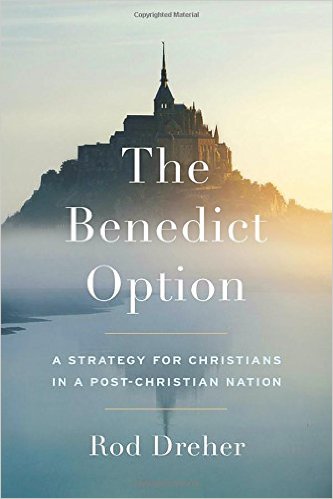 Remember the time I did a whole set of columns reviewing Rob Bell’s Love Wins where I felt I had to offer tons of background, describe his other books, engage some of the other stuff that had been said about him and his work? I wrote more words about the book than were in that book. I’d really like to do that again this week to offer some reasoned contribution to the already much-debated brand new book by Rod Dreher, The Benedict Option: A Strategy for Christians in a Post-Christian World but I simply cannot. I just don’t have time, fighting off the new Dark Ages as we are here at our little bookstore. And the snow.
Remember the time I did a whole set of columns reviewing Rob Bell’s Love Wins where I felt I had to offer tons of background, describe his other books, engage some of the other stuff that had been said about him and his work? I wrote more words about the book than were in that book. I’d really like to do that again this week to offer some reasoned contribution to the already much-debated brand new book by Rod Dreher, The Benedict Option: A Strategy for Christians in a Post-Christian World but I simply cannot. I just don’t have time, fighting off the new Dark Ages as we are here at our little bookstore. And the snow.
And, anyway, there are plenty of reviews circulating — mostly favorable on the right side of the internet, critical elsewhere — and some venues are inviting various voices into discussion (I did not read them yet, but CT has a five-voice forum that looks good and there is an upcoming live symposium with Mr. Dreher in New York City next week which one can livestream that will include a handful of different perspectives, including, interestingly, some folks from the Hutterite community that publish The Plough, and our friend Michael Wear, who is bone fide politico, having worked in the Obama White House.)
So, I will try to explain a bit about why I like some of this book and dislike some of it and why it has seemed to me, at least in the weeks leading up to the release date yesterday, that some are missing some of the important portions of the book that I think deserve our attention. And, naturally, I will say why I think you should consider buying it, even if it isn’t the typical sort of book you read.
I recommend The Benedict Option: A Strategy for Christians… even though most BookNotes readers will find it needlessly alarmist about the “brute fact” of our secular culture and the impact its legislative and judicial rulings have had on religion and will find it fundamentally flawed about the “limited withdrawal” posture we should have within it. And I do think this posture is flawed and unwise, but we should not overstate Dreher’s position. He isn’t advising some full withdrawal into some cloistered community like the Amish or the Trappists, even though it’s fun to tweak him as if that is what he is proposing. He’s a fun and funny guy, actually, and can take some ribbing, but lets be fair and not mis-state what he is calling for.
Some will like the urgent, manifesto-like tone of the writing (the ad copy properly calls it a “rallying cry”) but many will be troubled that the rallying cry is not just to resist the toxic erosion of notions of truth and goodness and particular virtues that only make sense within a monotheistic context, but to guard against the “relentless onslaught” by forming alternative (classical) schools or taking up serious homeschooling in ways that can impart older more sturdy values without distraction. Parochial schools aren’t that unusual — Roman Catholics, Lutherans, Episcopalians, and many Reformed folks sponsor them routinely — so let’s not get too cranky about this part of his manifesto, even if his reason for them is more reactionary than thetical. Others might resent his call to explore more liturgical forms of worship (he and his family are Orthodox and he scolds against shallow liturgy or entertainment approaches to worship), but the very popular Jamie Smith says similar stuff in his Imagining the Kingdom and You Are What You Love, so, again, this isn’t odd. Still others might find his traditionalist views of gender and sexuality to be overstated or presented unhelpfully as essential dogma; I know I do. There’s a lot in this book that will rub most normal Christians the wrong way, even if most of us know we need some new strategies about vibrant faith in these troubled times. I’m irked by a lot of things in the book, but want to look for the sensible and helpful and good. You too?
Despite many flaws, The Benedict Option is going to be talked about a lot in the weeks ahead – indeed, it has been anticipated for years and we’ve had a few folks who pre-ordered it from us months ago. Perhaps you saw the cover story in the largest religious magazine in America, CT or Jamie Smith’s harsh critique in The Washington Post. The hashtag #benedictoption is all over twitter (oh, the irony) and everyone is noting how widely it is being discussed. I’ve avoided reading most of these reviews but I’m eager to, soon.
I can’t write all that I’d like to at this point, but I will say that it was a fabulous reading experience. I have gone through my advanced copy twice, now. I’ve underlined more sentences than not in some chapters and I’ve scribbled in the margins more than in any book I’ve read for quite a while. I’ve learned a lot, was reminded of a lot (the overview in Chapter Two of the history and rise of secularization is worth the price of the book) and was challenged to think about what I believe about our culture and our times and the proper texture of daily discipleship and whether I’ve compromised too much. I have also, admittedly, wondered how I might view this book differently if I had young children.
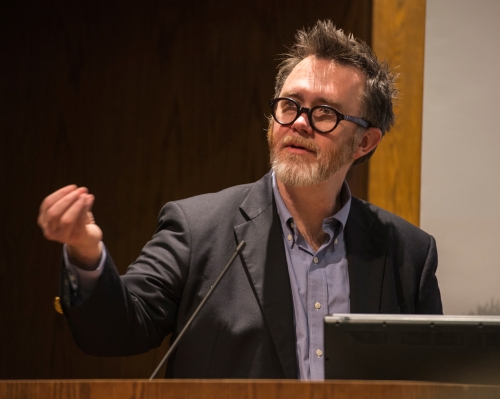 And, for the record, my wife and I met Rod and his wife at a conference book signing a few years ago and had a blast. We laughed and talked and truly enjoyed them a lot. I hope we cross paths again.
And, for the record, my wife and I met Rod and his wife at a conference book signing a few years ago and had a blast. We laughed and talked and truly enjoyed them a lot. I hope we cross paths again.
As one who wants to be a life-long learner with the habit of studying “both sides” of many issues, I sometimes read things I don’t think I’ll like; I hope you do, too. Honest liberals need to grapple with the best critiques from the right and conservatives need to stop rolling their eyes and read the best liberals. I think this is a helpful practice as we read theological books from outside our own tradition but especially when reading about culture, politics, and social criticism. I don’t know which is more scary for folks, but it does involve risk and demands a certain sort of generosity of spirit and openness to actually change one’s mind. There’s so much to learn and so many important insights from various quarters and we will have deeper integrity if we take in as much as we can.
For what it’s worth, that is one reason I have commended Richard Mouw’s memoir of his own studies and reading and engaging in conversations with a wide array of folks, believers and other-wise; if you resonate with my pitch for reading (even Dreher) generously, you’ll love Mouw’s Adventures in Evangelical Civility: A Lifelong Quest for Common Ground.
Besides, it seems to at least some of us that the old tired answers of the right and left seem nearly expired; it is crucial, as we’ve said before, to have Biblically-shaped ideas that move beyond standard-fare polarities. Old ideologies are dying and perhaps the Spirit is doing a new thing, helping us see beyond left vs right, secular vs fundamentalist, progressive vs conservative. (See David Koyzis’s book Political Visions and Illusions: A Survey and Christian Critique of Contemporary Ideologies for a serious study of how the ideological roots of the left and right are, in fact, more similar than you might know, suggesting that Christians ought to move beyond both.) I am not sure if Dreher himself would agree with this — he thinks that a certain sort of conservatism is consistent with and perhaps required by a Christian social ethos — although he surely isn’t unaware that some long for something other than what might look like frosting an essentially non-Christian cake with religious icing.
So, an obvious case can be made for learning from others unlike ourselves. I hope this book is read widely, including among non-conservatives. At the very least, it is important to be aware of what many of our serious, fellow believers are reading, and this one is one of the big books of the year. Those disinclined to Dreher’s conservatism (he is a senior editor of the principled, thoughtful, The American Conservative and was therefore not easily inclined towards candidate Trump, btw) ought to follow his argument. It is a book that someone might even ask you about, and Christian thought leaders (like BookNotes readers and Hearts & Minds customers) ought to be aware of Dreher and the firestorm of a conversation he has caused.
Here are at least seven important things to know about this fabulously feisty, frustrating, fascinating book.
SAINT BENEDICT OF NURSIA
First: the Benedict Option movement, as Dreher describes it, draws its name, most obviously, from St. Benedict of Nursia, the sixth century monk who formed spiritual communities as the dark days of the early Middle Ages were hitting, after the awful fall of the Roman Empire. The book was released (not intentionally, since the secular publisher didn’t know) on the Eastern Orthodox Feast Day of St. Benedict, who happens to be Rod Dreher’s patron saint, a “coincidence” that is beyond nice.
Few of us know much about the horrors of the collapse of southern European culture in those years and Dreher’s linking the West’s contemporary slide into decadence and dissolution to those years is not a new move but is worth hearing again. He describes Benedict’s visit to the desperate city of Rome “one day near the turn of the sixth century” which was, we are reminded, about a generation after the Visigoths sacked the so-called Eternal City. Although much of the book tells of delightful visits to Benedictine monasteries (including the earliest ones in Italy) the motivation behind the formation of monastic communities — to allow the faith to survive as it otherwise might not in a utterly corrupt culture — pervades the whole argument of the book. He doesn’t suggest that we become Benedictines as such, but he explains the attraction of monastic lifestyles that are so focused on their life together that they are somewhat removed, at least in attitude, from the ways of the world, and proposes that we adapt the famous Rule for our own deteriorating lives in our own sacked empire here in late modernity. Dreher believes deeply that the time has come to give up any naive efforts to reform the culture, especially through political means — which might be a hard sell to many on the right who are now elated and newly engaged in politics after the defeat of Hillary Clinton and the loudness of President Trump — but Dreher insists things are too far gone for that. It is time to re-group and strengthen our own understandings and virtues, based on a renewed focus on the gospel. Contra Mundum and all that.
There is a lot in here about Benedict, his famous Rule for life, and Dreher offers nice stories about real monks and nuns with whom he has visited and shows us how even non-Catholic lay folks can appropriate their wise sense of stability, their commitments to prayer, their holy friendships in community. This is good stuff and we should be glad for his lively challenge to take our discipleship more seriously. There are other and better books on Benedictine spirituality (and I’ll name a few in my next BookNotes newsletter) which are not tied to a reactionary and arguably alarmist sense of cultural withdrawal. But there is some nice stuff here that Dreher tells us about for those who don’t know much about the winsome wisdom from the monastics.
I do sort of wonder if many — especially conservative Protestants — who are raving about the book have ever been to a monastery, have ever spent time on a silent retreat, or if they know any real religious. (And if you think there’s a grammatical error there, I make my point.) I hope Dreher’s use of Benedict draws conservative evangelicals to read some contemplative spirituality and explore the strengths and weaknesses of monastic life a bit so they can make a reasonable judgement. I do want to note that some who sometimes rant against Catholics seem to like this book, perhaps because it is so clear about being conservative; does their conservative ideology now trump their doctrinal scruples? Well, Rod draws on ancient Catholics and is, as we’ve said, himself an active member of an Orthodox church and I’m glad if he’s getting Gospel Coalition or Acts 29 folks reading about his tradition. Who knows, maybe they’ll pick up Frederica Mathewes-Green or Alexander Schmemann or Kallistos Ware or John Hopko or Anthony Bloom.
A NEW BENEDICT NEEDED AS PROPOSED BY ALASDAIR MACINTYRE
Secondly, and importantly, the call for a new Benedict to lead us in a monastic sort of option, regrouping in radical community to avoid the pressures of secular modernity, comes from one of the most important philosophers of the twentieth century, Alasdair MacIntyre, from one of the most 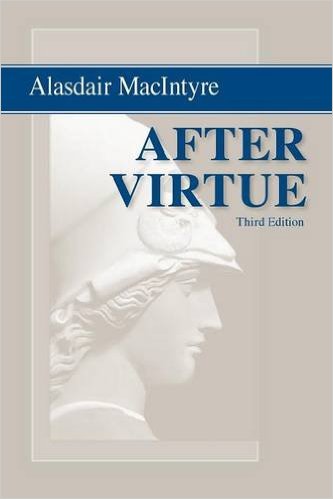 important philosophy books of the last 50 years: After Virtue: A Study in Moral Theology, published by the University of Notre Dame Press.
important philosophy books of the last 50 years: After Virtue: A Study in Moral Theology, published by the University of Notre Dame Press.
Some of us, significantly, learned of MacIntyre from Duke philosopher and theologian Stanley Hauerwas, who has been accused due to his high eccliesiology, of being sectarian. Apparently MacIntyre will do that to you. This is an important link, left unexplored by Dreher, but Dreher’s own dour look at modernity and the need for radical alternative narratives supported by alternative communities of practice bear similarities to Hauerwas and one of his influences, the late, radical Mennonite John Howard Yoder. Neither Hauerwas nor Yoder had anything to do with the befuddled fundamentalist right, and Dreher hardly did either, having been Catholic, and then Orthodox, but he, unlike them, is largely addressing the Christian right, calling them out of their false hopes of changing the world by some kind of conservative political agenda or some social renewal hastened by the election of Republican party candidates.
Dreher, like Hauerwas and Yoder, drawing on MacIntyre and his call for a “new Benedict”, knows (unlike some pop conservative pundits) that the problems of our culture did not start with the student rejection of authority in the 1960s or the sexual revolution of the ’70s or the relativism of postmodern college profs in the ’80s, a la Allan Bloom, say. Nope, this critique goes at least back to the disruptions of the early Industrial Revolution, and, more, to the rationalism of the secularizing Enlightenment symbolized by the French Revolution.
This is a line of thought familiar to those Reformed evangelicals who study Abraham Kuyper (who famously called his Christian political party in Holland the “Anti-Revolutionary” party; that is, against the spirit of the French revolution) or the detailed continental philosophy of the likes of Herman Dooyeweerd (found in heady books like The Roots of Western Culture) who influenced Francis Schaeffer. Simplistic as it may be, there is a profound kernel of much insight in Schaeffer’s How Should We Then Live?: The Rise and Decline of Western Thought and Culture which traces the flow of Western culture’s development and decline, showing the vast implications of the early church accommodating themselves to a sacred/secular dualism inherited from the pagan Greeks.
My favorite quick overview of culture through this basic lens, by the way, is in a few central chapters in Transforming Vision: Shaping a Christian Worldview by Brian Walsh and Richard Middleton, followed up powerfully in the early chapters of their Truth Is Stranger Than It Used to Be; Dreher nor Walsh & Middleton would see these similarities, I suppose, but they are exploring questions of how ideas have had grave consequences, how idols have deformed our views of culture and our social architecture.
For those informed more by the scholars of classic or paleoconservatism, you will hear in Dreher resonances from the likes of Edmund Burke, say, or Russell Kirk, maybe Isaiah Berlin or even G.K. Chesterton or even Hilaire Belloc. Dreher is big on Brad Gregory’s Harvard University Press book The Unintended Reformation: How a Religious Revolution Secularized Society, which he cites more than once. He makes use of Romano Guardini and his text The End of the Modern World. These are all names you should know and I’m glad he is informing us so well about important thinkers and serious reform movements.
Dreher sees the recent erosion of religious freedom protections and recent Supreme Court rulings as exceptionally detrimental for the common good but he realizes that the process of how we came to think as we do as a culture goes way, way back and our crisis is deeper than any recent Supreme Court ruling. Methinks he doesn’t go back far enough (failing to grapple with how early church thinkers were too often accommodated to pagan classical culture, a move he doesn’t seem to fret much about. Augustine influenced by Plato? Aquinas by Aristotle? No biggee, apparently.)
It shouldn’t surprise us, then, that even as Dreher encourages a new kind of neo-monasticism that can form a worldview able to resist our culture’s secularizing trends and the subsequent sexual laxity and family breakdown, he holds up yet another Benedict, Pope Benedict XVI, as one important thinker from recent years. Dreher nicely cites Deus Caritas Est, Pope Benedict’s 2005 encyclical letter.
KEN MYERS, CHARLES TAYLOR, LIQUID MODERNITY AND MORE– MADE ACCESSIBLE
Yes, Dreher is a fabulously well-read popularizer, and to see his citations of MacIntyre and – of course! – Charles Taylor, is fantastic. (He should have recommended James K.A. Smith’s intro to the difficult philosopher, How (Not) To Be Secular: Reading Charles Taylor.) Another author Dreher draws on significantly and who he explains very helpfully is Philip Rieff (we stock his magisterial The Triumph of the Therapeutic: Uses of Faith after Freud.) This is heavy, serious stuff, and we are in his debt for bringing these scholarly assessments to our attention in understandable ways.
Dreher talks a lot about Vaclav Havel, draws on Zygmunt Bauman (Liquid Modernity), the sociologist Robert Nisbet, the Catholic critic Patrick Deneen, and even happily brings in some of C.S. Lewis’ studies of medieval literature. Just reading this book is itself an education in one strain of social thought, at least, and it is a good learning exercise. In many ways this is the great strength of the book, giving a sturdy basis for a traditionalist critique of modern progressive impulses.

It might be helpful for some of our customers to realize that the book is dedicated to Ken Myers, known to many as the brilliant producer of the heady, extraordinary Mars Hill Audio. That explains quite a lot.
CRUNCHY CONS AND WENDELL BERRY
Fourth, you may find it curious that Dreher’s first book (now, sadly, out of print) was called Crunchy Cons: How Birkenstocked Burkeans, Gun-Loving Organic Gardeners, Evangelical Free-Range Farmers, Hip Homeschooling Mamas, Right-Wing Nature Lovers, and Their Diverse Tribe of Countercultural Conservatives Plan to Save America (or at least the Republican Party). Ha. He revisits a bit of that on the first page of this new book, writing:
For most of my adult life, I have been a believing Christian and a committed conservative. I didn’t see any conflict between the two, until my wife and I welcomed our firstborn child into the world in 1999. Nothing changes a man’s outlook on life like having to think about the kind of world his children will inherit. And so it was with me.
As Matthew grew into toddlerhood, I began to realize how my politics were changing as I sought to raise our child be traditionalist Christian principles. I began to wonder what, exactly, mainstream conservatism was conserving. It dawned on me that some of the causes championed by my fellow conservatives – chiefly an uncritical enthusiasm for the market – can in some circumstances undermine the thing that I, as a traditionalist, considered the most important institution to conserve: the family.
I also came to see the churches, including my own, as largely ineffective in combating forces of cultural decline. Traditional, historic Christianity – whether Catholic, Protestant or Eastern Orthodox – ought to be a powerful counterforce to the radical individualism and secularism of modernity. Even though conservative Christians were said to be fighting a culture war, with the exception of the abortion and gay marriage issues, it was hard to see my people putting up much of a fight. We seemed content to be the chaplaincy to a consumerist culture that was fast losing a sense of what it meant to be a Christian.
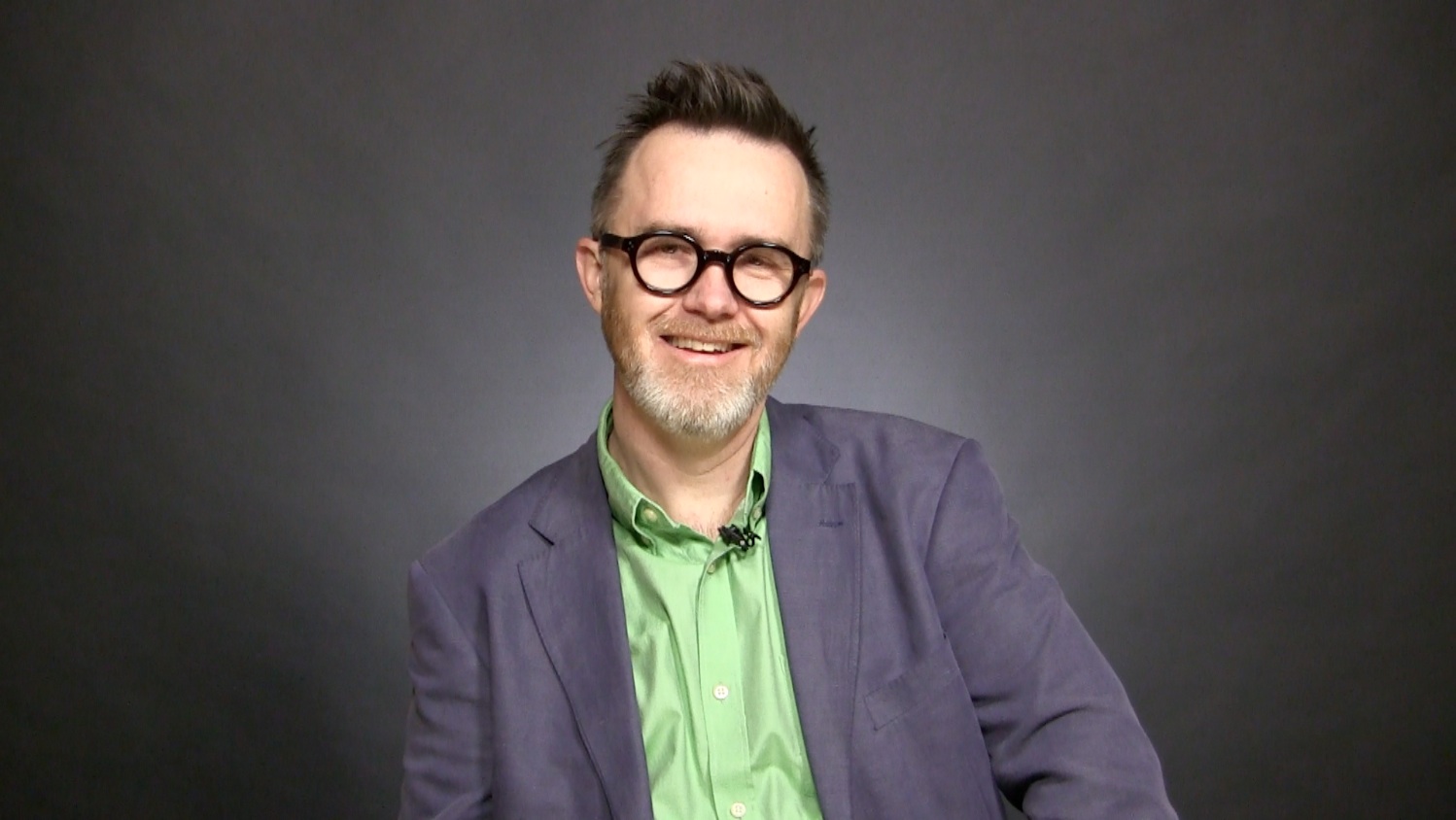 So, get this: in his explorations ruminating on how conservatives too often bought into an ideology that made an idol out of markets and failed to critique the individualism and consumerism that drove the modern age, he realized that there could be some cooperation with the hippy dippy green movement — supporting farmer’s markets, encouraging the “buy local” campaigns that shore up frayed social fabric, fighting suburban sprawl and Wal-Mart and McDonalds, realizing the dangers foisted on us all by TV and not just the big state but also big business.
So, get this: in his explorations ruminating on how conservatives too often bought into an ideology that made an idol out of markets and failed to critique the individualism and consumerism that drove the modern age, he realized that there could be some cooperation with the hippy dippy green movement — supporting farmer’s markets, encouraging the “buy local” campaigns that shore up frayed social fabric, fighting suburban sprawl and Wal-Mart and McDonalds, realizing the dangers foisted on us all by TV and not just the big state but also big business.
That is, he was reading Wendell Berry.
Wendell Berry’s spirit and good words informed that first book, then, called Crunchy Cons. (Crunchy, as in granola, and Cons, short for Conservatives. You’ve heard of, say, neo-cons and paleo-cons. He was proposing Crunchy Cons — get it?) As you might guess, we reviewed it favorably, tried to sell it, but it fell between the cracks. It was too critical of some forms of conservatism to be picked up by the right and it was still fundamentally a “con” perspective, so the greens didn’t go for it. All those people in that long, playful subtitle? Not a very big tribe, after all.
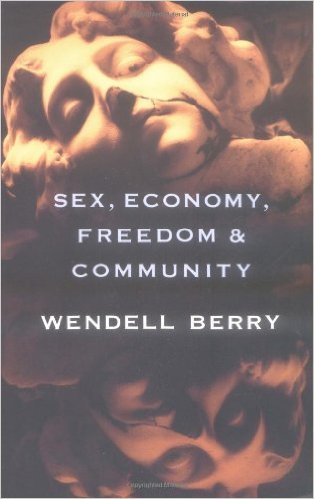 By the way, I have to say in passing that although Rod quotes Wendell several times in The Benedict Option it is selective. He nicely cites Berry’s comments about stability and family and fairly traditional views of sexual fidelity. (In one brilliant essay in Berry’s Sex, Economy, Freedom & Community: Eight Essays – which Lauren Winner so beautifully describes in her book Real Sex: The Hidden Truth about Chastity — Berry explains how consumerism shapes us to want stuff for ourselves, which has less than subtly deformed our views of sexual desire; Ms. Winner says maybe the thing to do to resist her lust and help her learn sexual chastity is to quit going to the mall to buy more sweaters. Learning to say no to American capitalism’s reductionism and deforming of our desires might be a deeper, better practice to help us think differently about a theology of the body and a wholesome view of sex., more serious and radical than evangelicalism’s penchant for morality pledges and purity rings.)
By the way, I have to say in passing that although Rod quotes Wendell several times in The Benedict Option it is selective. He nicely cites Berry’s comments about stability and family and fairly traditional views of sexual fidelity. (In one brilliant essay in Berry’s Sex, Economy, Freedom & Community: Eight Essays – which Lauren Winner so beautifully describes in her book Real Sex: The Hidden Truth about Chastity — Berry explains how consumerism shapes us to want stuff for ourselves, which has less than subtly deformed our views of sexual desire; Ms. Winner says maybe the thing to do to resist her lust and help her learn sexual chastity is to quit going to the mall to buy more sweaters. Learning to say no to American capitalism’s reductionism and deforming of our desires might be a deeper, better practice to help us think differently about a theology of the body and a wholesome view of sex., more serious and radical than evangelicalism’s penchant for morality pledges and purity rings.)
Anyway, Dreher likes Berry on the traditional family and he seems to like Berry’s critique of fast-paced materialism and a life lived out-of-place, disconnected to community and place; he shows that Berry’s sexual ethics are traditional. He doesn’t draw in Berry’s critique of violence, militarism, patriotism, and the like. He doesn’t quote the Mad Farmer poem. That Rod worries about kids being seduced in school to the evils of porn (a valid fear) but not civil religion or racism or nationalism is, from my view, a huge inconsistency. and more then a “blind spot.” Maybe a little Franciscan spirituality – or at least a little Anabaptism or even punchy Hauerwas — would have been a helpful contribution to Dreher’s formation.
Or at least a little more submission to Brother Wendell. I know from Crunchy Cons that Dreher likes the Kentucky farmer, but I couldn’t help but feel like he was using Berry’s popular name, popular especially on the left, mostly to reinforce his conservative views of the family and gender.
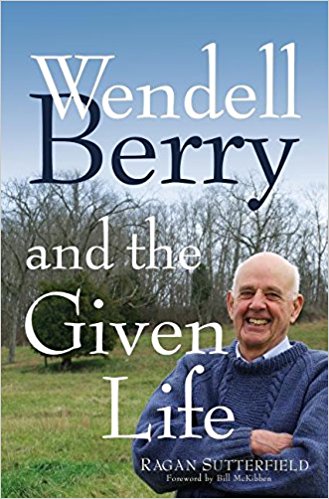
(A brand new book that does honor Berry a bit more consistently, by the way, just came out from Regan Sutterfield, on a Franciscan press, no less, called Wendell Berry and the Given Life. I hope to review that soon, and, along with, say, Wendell Berry and the Cultivation of Life: A Reader’s Guide by Matt Bonzo and Michael Stevens, would help supplement the Benedict Option vision, insuring it not be confused with or co-opted by an agenda of the secular or religious right.)
My annoyance of Rod’s selectively using Mr. Berry notwithstanding, it is good to see a conservative caring about conservation. He doesn’t say it nearly enough to be Biblically faithful — the Scriptures (and the current Pope, I might add) simply require it and any piety or social ethos worth its Biblical salt will say so — but he’s not disinterested in care for the land. The Benedict Option helps us in wondering how to create communities that have the wherewithal to stand against the tide that wants to sweep so much away. (Recall it was Karl Marx who predicted that in advanced capitalism “all that is solid melts into air.”) Such a vision of spiritually attuned fellowships, a renewed, sustainable economy and better creational stewardship, good work and non-mainstream learning and mature, artful, worship demands some kind of community. We can’t do this stuff alone. And we can’t form deeper community if we don’t give up our mobility, our transience. He gets that and reminds us of it. It is a reminder we all need, often.
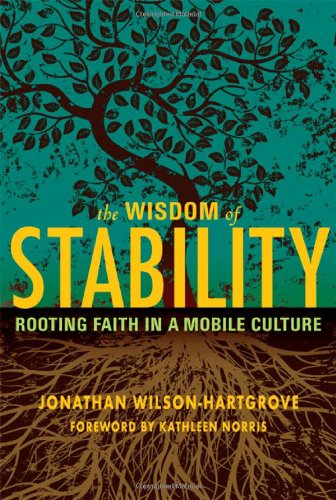 (I know Dreher didn’t need to cite my favorite books on this, but just this year we’ve seen on popular evangelical presses wonderful books just as Staying is the New Going: Choosing to Love Where God Places You by Alan Briggs and Renovate: Changing Who You Are By Loving Where You Are by Leonce Crump, each similar to Jonathan Wilson-Hartgrove’s stunning (and Benedictine-inspired) The Wisdom of Stability: Rooting Faith in a Mobile Culture. These all argue for a more localist way of living, staying put, as they say, but don’t have any of the “the ship is sinking and we have to form community like an ark to preserve ourselves” vibe that we get from Dreher.)
(I know Dreher didn’t need to cite my favorite books on this, but just this year we’ve seen on popular evangelical presses wonderful books just as Staying is the New Going: Choosing to Love Where God Places You by Alan Briggs and Renovate: Changing Who You Are By Loving Where You Are by Leonce Crump, each similar to Jonathan Wilson-Hartgrove’s stunning (and Benedictine-inspired) The Wisdom of Stability: Rooting Faith in a Mobile Culture. These all argue for a more localist way of living, staying put, as they say, but don’t have any of the “the ship is sinking and we have to form community like an ark to preserve ourselves” vibe that we get from Dreher.)
Dreher quoted Alasdair MacIntyre back in that first (Crunchy Con) book, declaring that Western civilization had lost its moorings. In The Benedict Option he explains where this MacIntyrian vision led him, years ago:
I called the strategic withdrawal prophesied by MacIntyre “the Benedict Option.” The idea is that serious Christian conservatives could no longer live business-as-usual lives in America, that we have to develop creative, communal solutions to help us hold on to our faith and our values in a world growing ever more hostile to them. We would have to choose to make a decisive leap into a truly countercultural way of living Christianity, or we would doom our children and our children’s children to assimilation.
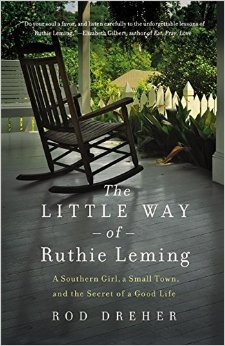 Although it truly is a memoir, not a book of social analysis, you can see lovely notes of this concern in his memoir about moving home to small town Louisiana to learn from the folks there who showed such faithful friendship and support to his sister who was dying of cancer. I do hope you know The Little Way of Ruthie Leming: A Southern Girl, a Small Town, and the Secret of a Good Life — it is one of our very favorite books! You should read its sequel, too, that further shares so much of Rod’s back-story: How Dante Can Save Your Life: The Life-Changing Wisdom of History’s Greatest Poem. It is a very good read.
Although it truly is a memoir, not a book of social analysis, you can see lovely notes of this concern in his memoir about moving home to small town Louisiana to learn from the folks there who showed such faithful friendship and support to his sister who was dying of cancer. I do hope you know The Little Way of Ruthie Leming: A Southern Girl, a Small Town, and the Secret of a Good Life — it is one of our very favorite books! You should read its sequel, too, that further shares so much of Rod’s back-story: How Dante Can Save Your Life: The Life-Changing Wisdom of History’s Greatest Poem. It is a very good read.
MIXED MESSAGES
Number five: I have heard, but have not seen myself, that there are already some published criticisms of Rod’s posture of withdrawal and he has, I’ve heard, pushed back a bit insisting he does not counsel a full resistance or complete withdrawal. This is maybe a fifth thing to know about the book: it isn’t fully clear or consistent about how bad things are and subsequently how much we need to retreat.
Most often he makes it sound very bad out there. And he implies that the retreat must be severe.
I want to be fair here, but I think one of the problems with evaluating the Benedict Option is that in this manifesto there are mixed messages or maybe inconsistencies. Dreher is dire at almost every point about our culture (Jamie Smith is right, if not adequate, in his Washington Post critique of the alarmism that pervades the book.) Some of it reminded me of the furious raging in the final book of Francis Schaeffer which eroded his reputation and offered a sad end to his important life; it was as if the sky really was falling. Franky Schaeffer, his son, by the way, has written candidly about how some of the fury was manufactured in those years so that they could earn the trust of the rather stupid religious right, with stories such as the time Schaeffer had to bite his tongue as Jerry Falwell mocked renaissance nudie art. Dreher is not about to mock classic paintings for their negative effect on our children, but he seems at times almost ready to explode in some righteous jeremiad about nearly anything in popular modern life.
I can hardly believe some of the breathy phrases he uses insisting that the culture has had its way with us, that it is all but over, that secularism has won the day, that we may not be able to be Christian in this society any more. It at times almost sounds as if the church hasn’t been through this before, or that the faithful Hebrews in exile in Babylon weren’t told to serve their captors by “seeking the welfare of the city” in which God had sent them. That Dreher doesn’t address this Jeremiah 29 passage that is so popular in mobilizing a young generation of urbane evangelicals serving their cities is astonishing to me.
He warns us not to be naïve about these negative things and their lasting impact, and I want to hear him, but I still think he worries a bit too much, and, that even if his worries are prescient, his strategy isn’t adequately Biblical.
He reminds us, as he should, of the dangers of porn and the shifting relativism that seems to erode our sexual ethics and the rise in violence and cynicism and more. Some of Dreher’s discernment, by the way, is driven by the way businesses bailed on supporting states that insist on RFRA legislation and on what he sees as vast implications of Obergefell. He uses the battle language of watershed and Waterloo; the jig is up, it’s over. I think he is helpful as he highlights important ideas and consequences of the genealogy of ideas in the West (coupled with some attention to deforming practices and cultural habits.) But despite this deep level critique of the engines of idolatry and what he calls “hostile secular nihilism” he too often ends up sounding like a shrill right wing talk show pundit complaining about policy he doesn’t like.
Many sentences carry thoughtful brilliance like this:
The long journey from a medieval world wracked with suffering but pregnant with meaning has delivered us to a place of once unimaginable comfort but emptied of significance and connection. The West has lost the golden threat that binds us to God, Creation, and each other. Unless we find it again, there is no hope of halting our dissolution.
Or:
If a defining characteristic of the modern world is disorder, then the most fundamental act of resistance is to establish order. If we don’t have internal order, we will be controlled by our human passions and by the powerful, who are in greater control of directing liquid modernity’s deep currents.
And then he declares, given our “political weakness” that “nothing matters more than guarding the freedom of Christian institutions to nurture future generations in their faith.” Nothing? Oh my.
Oddly, he then follows this patently wrong statement with a disclaimer (in italics): religious liberty is not an end in itself but a means to an end. The book does this a bit, zealously overstating things and then moderating his view, which is why you should read it carefully, with an open mind, as a line that may infuriate may be moderated in the very next paragraph.
There are moments Rod writes nicely about some of the good things of our culture, and he assures us that we ought to not reject the world a such. At least I think I recall that he did, but I can’t find where. But then he writes stuff like this, in a page or two on what MacIntyre (and others) called the new barbarism:
…despite our wealth and technological sophistication, we in the modern West are living under barbarism, though we do not recognize it. Our scientists, our judges, our princes, our scholars, our scribes — they are at work demolishing the faith, the family, gender, even what it means to be human. Our barbarians have exchanged the animal pelts and spears of the past for designer suits and smartphones.
Yep, there’s that, those damn guys in suits who use phones. I guess in this vast generalization he doesn’t include his own role as a scholar and scribe, or the judges he voted for or the faithful scientists he surely knows.
SIXTH: HOW ALARMIST SHOULD WE BE AND ALARMED ABOUT WHAT?
This isn’t so much something you need to know about the book itself, but a way to describe my ambivalence about some of it. I guess that’s it: you may be ambivalent about some of it, too, but that’s okay.
It would take me a bit too far afield at this point to explain why I am less pessimistic than Dreher is about the cultural ramifications of the social trends he hates, especially the ones pertaining to same sex relationships and family law. I support as a matter of liberty and justice for all, legislation and court  rulings in favor of marriage equality in our pluralistic society and disagree with him that this is disastrous for Christian discipleship; my own discipleship hasn’t become any more difficult since Obergefell v Hodges; really it hasn’t. I’m still too much of a jerk and always in need of God’s grace, but the Supreme Court ruling didn’t change that one bit. (I found it nearly surreal reading some astonishingly outlandish statements insisting that we can’t even be Christian with such a ruling as Obergefell in our background. This really is a driving force for him; it is, he insists, about “order.” And that’s a theological notion that needs to be more carefully explored, I’d suggest. We know what happens when a movement makes too much of a fetish out of order and fears “disorder.” I’m not suggesting we take lightly dis-order and certainly agree with Rod in his desire to resist whatever the Bible calls sin. But his fear and anxiety about the shift away from order is notable.)
rulings in favor of marriage equality in our pluralistic society and disagree with him that this is disastrous for Christian discipleship; my own discipleship hasn’t become any more difficult since Obergefell v Hodges; really it hasn’t. I’m still too much of a jerk and always in need of God’s grace, but the Supreme Court ruling didn’t change that one bit. (I found it nearly surreal reading some astonishingly outlandish statements insisting that we can’t even be Christian with such a ruling as Obergefell in our background. This really is a driving force for him; it is, he insists, about “order.” And that’s a theological notion that needs to be more carefully explored, I’d suggest. We know what happens when a movement makes too much of a fetish out of order and fears “disorder.” I’m not suggesting we take lightly dis-order and certainly agree with Rod in his desire to resist whatever the Bible calls sin. But his fear and anxiety about the shift away from order is notable.)
I am also, by the way, a supporter of religious freedom, from the rights of Muslim prisoners not to be shaved to the right of religiously motivated bakers or photographers, for instance, not to be coerced by social convention or forced by the state to violate their consciences and be made to participate in same sex-marriages; such freedom of conscience is akin to our government’s good heritage of religious conscientious objection in matters of the draft into the military, by the way, and vital for a free culture) and think that most RFRA regs are mostly just and helpful and worthy of support. I agree with Rod that the erosion of such liberties is concerning. I care about them so much I’d rather fight for them, in fact, rather than withdraw with a sad shrug, but that maybe is a cheap shot.
Interestingly, the former White House staffer we had in the bookstore a few days ago, Michael Wear, a Democrat who served at the pleasure of President Obama, whose book Reclaiming Hope: Lessons Learned in the Obama White House About the Future of Faith in America is helpful on this very matter, agrees; Wear ends his reflection on the contemporary civic ethos by affirming religious freedom questions as crucial for the common good. It is my sense that this need not be a partisan issue, but that honoring religious diversity and freedom of conscience is a good thing in a religious pluralistic culture.
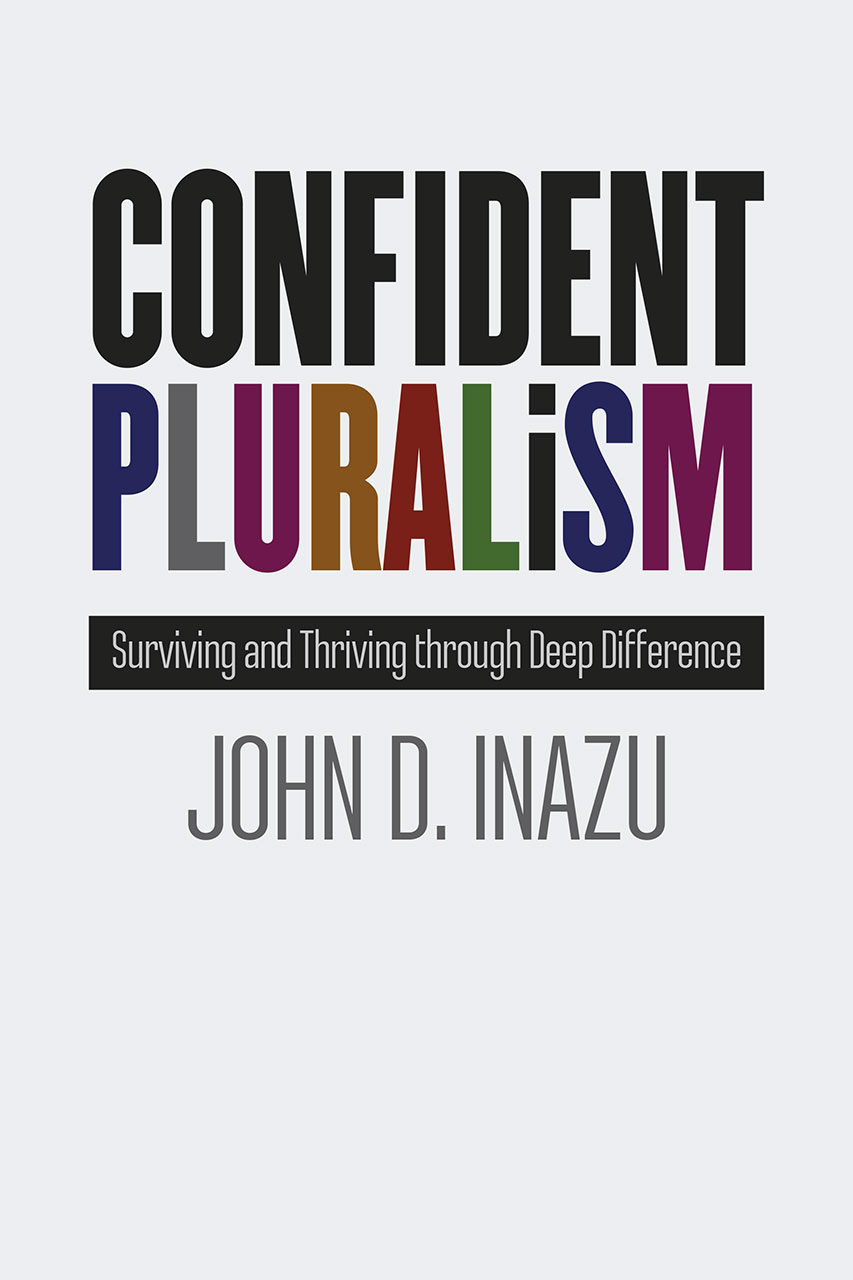 John Inazu’s book Confident Pluralism: Surviving and Thriving Through Deep Difference is a major resource in this cultural conversation. I value Os Guinness’ work on this, too: see his A Free People’s Suicide: Sustainable Freedom and the American Future or his older, serious, The Case for Civility: And Why Our Future Depends on It which lays out a plan for principled sorts of structures for honoring freedom of speech and the like.
John Inazu’s book Confident Pluralism: Surviving and Thriving Through Deep Difference is a major resource in this cultural conversation. I value Os Guinness’ work on this, too: see his A Free People’s Suicide: Sustainable Freedom and the American Future or his older, serious, The Case for Civility: And Why Our Future Depends on It which lays out a plan for principled sorts of structures for honoring freedom of speech and the like.
You see, I can’t help myself, wanting to recommend resources for our cultural struggle in this historic moment. I will list more, later. As much as I agree with Rod that we need to attend to our own spiritual lives so we have something real to give to the watching world, we cannot give up this God-given calling to be reforming agents, no matter how misunderstood we may be. And our care for the world, our neighborhoods and civic culture involve much more than responding to legislation about sexuality or our own religious freedoms.
Dreher overstates much about sexuality and although I was glad for his reminder that the church must always be kind and gracious to those who often feel excluded – including persons in the LGBTQ community – his using the culture’s recent support for same sex relations and the rights of transgendered persons as such a huge watershed seemed weird to me. And I’m afraid he’ll say, “See: that proves my point.”
Even though he helps us frame our cultural moment by the bigger shift towards “the therapeutic self” and the dis-connected radical individual (who is now all about a self to be fulfilled rather than a soul to be shaped) some of the Benedict Option book still just seems fixated in a way that the Bible is not on matters of sexual purity.
(That there is precious little Bible study in this book is itself a problem and that Dreher merely genuflects to “the tradition” or maybe “natural law” is, again, for this evangelical, at least, problematic. His social imaginary, his worldview, his hermeneutic of interpretation — what to get alarmed at, what to cry out about, what to resist, where we are, what time it is, culturally, so to speak — seems not to be driven by the Biblical story much. He says early in the book that it is not a “decline and fall narrative” but that is a large part of it. It is worth reading and it is somewhat compelling. But it isn’t a Biblically-inspired story of God’s redeeming power, restoring all things, the Kingdom coming, our missional task. Geesh, where’s Tom Wright when you need him? And why no “every square inch” being claimed by Christ quote, anyway? More importantly, why no citation of Colossians 1? Can anyone write a book about a strategy for cultural engagement without going there? Or 2 Corinthians 5? How can one propose even strategic, limited withdrawal on some safe ark without explaining how, then, we shall be “agents of reconciliation” or, as Paul puts it, ambassadors. It’s a metaphor that doesn’t work on an ark.
Another case in point of missing Biblical insight: he only seems to get there, finally, once (on page 203) but he admits that his tradition’s disapproval of same-sex partnerships is related to the notion that they cannot procreate. I am not Orthodox or Roman Catholic but respectfully submit that I do not think this is a helpful theological formulation of the matter of same-sex attraction or what constitutes just marriage laws. Does the Bible teach this? Should it be the basis of how to think about just legislation for our fellow citizens? It’s complicated, and not self-evident, despite Rod’s apparent assumption that it is.
But then, frustrated as I am, worried that he’s just fear-mongering in the way Jerry Falwell did decades 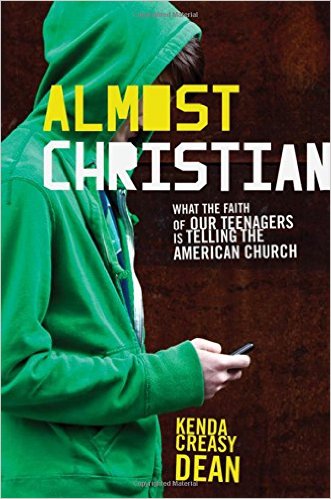 ago, he tells a story about middle school kids watching hard core porn on their cell phones. He laments the number of young women pregnant without the father intending to be involved in the lives of their children. He mentions the unusually high number of middle school girls who announce confidently that they are bi. He describes the shallow sort of religion found in many churches, drawing on the significant work of sociologist Christian Smith (see Soul Searching: The Religious and Spiritual Lives of American Teenagers and Lost in Transition: The Dark Side of Emerging Adulthood, or the very important popularization of that work found in Kenda Creasy Dean’s Almost Christian or even David Kinnaman’s You Lost Me.)
ago, he tells a story about middle school kids watching hard core porn on their cell phones. He laments the number of young women pregnant without the father intending to be involved in the lives of their children. He mentions the unusually high number of middle school girls who announce confidently that they are bi. He describes the shallow sort of religion found in many churches, drawing on the significant work of sociologist Christian Smith (see Soul Searching: The Religious and Spiritual Lives of American Teenagers and Lost in Transition: The Dark Side of Emerging Adulthood, or the very important popularization of that work found in Kenda Creasy Dean’s Almost Christian or even David Kinnaman’s You Lost Me.)
He quotes books like the powerfully important recent volume by Tim Wu, The Attention Merchants: The Epic Scramble to Get Inside Our Heads and, with just a quick citing of Nicholas Carr and Neil Postman, underscores the dangers of over-reliance on cell phones and our “amusing ourselves to death” in a culture of what Neil Postman called “technopoly.” When he warns us about the actual dangers of the breakdown of community and family and mental health and meaning, he is right to sound the alarm. And I want to press the book into the hands of anyone who seems, as the prophet Amos said, “at ease in Zion.” It is not wrong to be alarmed by alarming things, right?
As I have said, I mostly disapprove of Rod’s nearly idolatrous overstatement about traditionalist 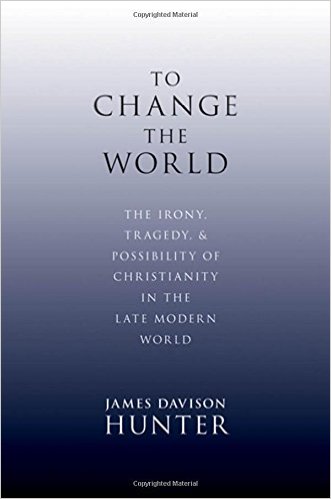 formulations of sexuality and his almost overstated call to “order.” Since he is writing to conservatives to sway them away from culture wars — perhaps almost in the tradition of To Change the World: The Irony, Tragedy, and Possibility of Christianity in the Late Modern World the Oxford University Press book by James Davison Hunter, but with less “in” and more “not of” the world — I get that he doesn’t use the Bible to explain his assumptions. He is not particularly evangelical and makes it clear he is writing firstly as a conservative, albeit a Christian one.
formulations of sexuality and his almost overstated call to “order.” Since he is writing to conservatives to sway them away from culture wars — perhaps almost in the tradition of To Change the World: The Irony, Tragedy, and Possibility of Christianity in the Late Modern World the Oxford University Press book by James Davison Hunter, but with less “in” and more “not of” the world — I get that he doesn’t use the Bible to explain his assumptions. He is not particularly evangelical and makes it clear he is writing firstly as a conservative, albeit a Christian one.
Perhaps that is just one large difference between me and him; he talks unashamedly about being a traditionalist and conservative and I find that at least a little awkward; not unlike when some of my friends are so clear that they are liberal or progressive, as if that is necessarily a virtuous thing. I have little interest in being left or right, but want to evoke some other “third way.” Perhaps I am naive to imagine such an option, but there it is. Those of us who are conscientious objectors in the culture wars and who do not think it is faithful to align faith with right or left, can still learn much from this work, though. So I critique it a bit, but only to inform you what your getting into. I still think it is well worth reading. Truly, I think that.
I like Russell Moore’s blurb on the back:
I’m more missionary than monastery, but I think every Christian should read this book. Rod Dreher is brilliant, prophetic, and wise. Even if you don’t agree with everything in this book, there are warnings here to heed, and habits here to practice.
For those readers who already agree with Mr. Dreher’s particular take on the battles of the culture wars, his call to live in ways that allow us to keep faith vibrant and thoughtful and robust should be seriously evaluated. I understand, given his assumptions about the toxic nature of modernity and postmodernity and the hyper-sexualized culture and the fast-paced 24/7 social media world of fame and celebrity and shallowness, how we must learn to guard against undue influence from the world; I understand that this concern about not accommodating may call for us to retreating a bit, giving up unrealistic attempts to “change the world” (especially through ill-considered moral majority’s and political campaigns.)
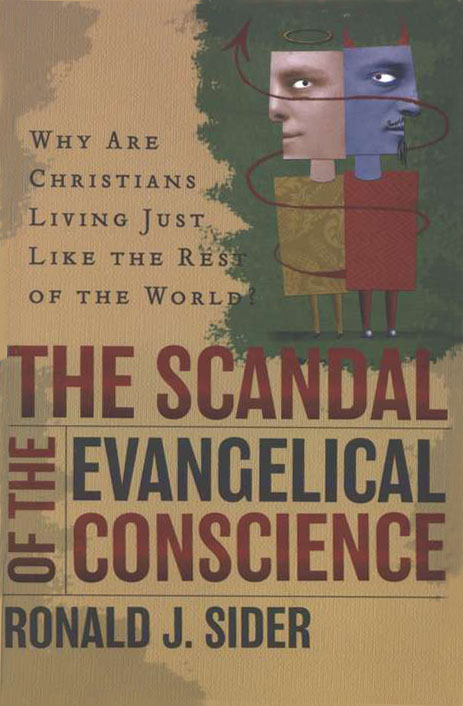 Reading The Benedict Option I am reminded of something I sometimes have said in talks and in writing here. We may have been unfair inspiring young adults in the last decade to “make a difference” and claim “every square inch” for Christ without forming them in spiritual practices that would yield Christ-like character and a commitment to holiness. I talk about “holy worldliness” but maybe don’t sound serious enough about the holiness part. We all should have tried harder, just for instance, to grapple significantly with the must-read research of Ron Sider and his important little book The Scandal of the Evangelical Conscience: Why Are Christians Living Just Like the Rest of the World?
Reading The Benedict Option I am reminded of something I sometimes have said in talks and in writing here. We may have been unfair inspiring young adults in the last decade to “make a difference” and claim “every square inch” for Christ without forming them in spiritual practices that would yield Christ-like character and a commitment to holiness. I talk about “holy worldliness” but maybe don’t sound serious enough about the holiness part. We all should have tried harder, just for instance, to grapple significantly with the must-read research of Ron Sider and his important little book The Scandal of the Evangelical Conscience: Why Are Christians Living Just Like the Rest of the World?
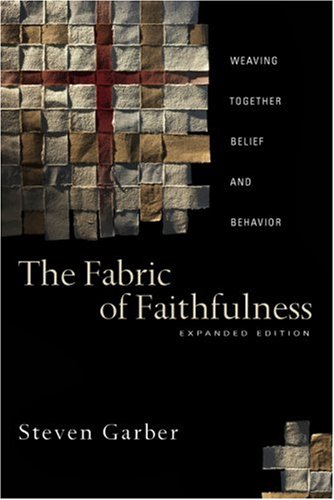
Similarly, my friend Steve Garber’s well respected 2007 book The Fabric of Faithfulness: Weaving Together Belief and Behavior reminds us of the deep significance of friendship and community (and mentors who help us apply truth in our own situations) if faith is going to be formative and decisive over the long haul of our lives. He astutely calls us to this counter-cultural triad of conviction, character, and community, but without Dreher’s conservatism or The Benedict Option alarmism.
Dismayed as I was by some of Rod’s lines about how bad things are and how difficult it may be to live out faith in our day and age, I liked his warnings that for some of us we might be called upon to suffer loss of prestige or even employment. Like Benedict in his own tumultuous, corrupting times, Dreher advises learning trades and crafts.
Many professional associations will demand that one sign pledges of support of sexual diversity and ethical relativism and he assumes that those with conventional Christian views will therefore soon lose their jobs in business, education, counseling, and other professions, if not by law, by the pressure of the professional guilds themselves. He reminds us that we will have to have in place some sort of structures and systems to support those who lose their jobs due to Christian convictions. He calls us to community, to supportive congregations that “do life together” so we can be there for each other in times of persecution or loss of income due to scruples in the marketplace.
For what it is worth, decades ago I met a number of people who, influenced by the passionate Catholic Bishops who insisted it was immoral to make nuclear weapons, left their jobs in defense contracting. I also knew a woman who quit her job in an abortion clinic. A network of activists helped folks in both situations, and I promised such aid to other defense contractors who I challenged to use their talents in more life-giving careers sites. So I get Dreher’s call to be community, even if I wish he’d have noted that the ethics of the marketplace are more complex and in a way more demanding than only this question of scruples around things like same-sex marriage. Why did he not talk about whistle-blowers in the environmental field, people who lose their jobs in public schools because of their support for poor children (think of Jonathan Kozol’s story) or pastors who become unemployed when they talk about God’s Word about serving the poor or financial workers who pay a price for not maximizing profits with adequate gusto? What about an ad man who won’t do a glamor ad that is too sexy? What about a woman science PhD who fears the data about the dangers of GMOs is being suppressed by her agribusiness supported university? What about a lawyer who wants to do too much pro bono work for the needy? As inspiring as his breathy Benedictine option of feisty countercultural faith that is so radical that it needs supportive community was for me, I have to wonder if he knows anybody who has lost their job due to their faith? Maybe so. I know I do. And it wasn’t about sex stuff.
ANCIENT WAYS OF PRAYER AND SPIRITUAL FORMATION
So, limited as his expressed concerns may be on that particular score (seeming to suggest that only certain sort of social ethics are demanded of us) and as many mixed messages as he gives — we should be monastic, but not really, we should be alarmed, but not really — Dreher and his provocative book points us in the right direction in calling us to create lasting relationships, be part of serious churches, ask hard questions about our lifestyles, gadgets, budgets, and habits. He invites us to consider how deeper, more ancient forms of prayerfulness and liturgy might slowly re-form us from what media critic Nicholas Car calls our “welcoming the frenziedness into our souls.” Perhaps we might withdraw from the world a bit and welcome a different set of virtues and a different quality of character into our lives. In a way, this is what the best spiritual writers have long said; in our generation Thomas Merton, Henri Nouwen, Richard Foster, Ruth Haley Barton, Joyce Rupp and more.
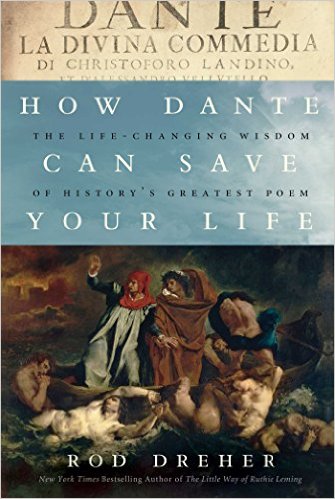 The Benedict Option shows us how to draw on ancient asceticism as a tool to help us keep our digital and media influences at bay. It insists on more active involvement in local churches to keep our spirits alive. Dreher asks us to consider starting alternative study groups, book clubs, young adult discipleship houses, even study centers, to study classical literature, history, poetry, and to allow deep truth to influence our hearts and minds. (He knows how this works somewhat and tells us all about it in the magnificent memoir of how he was somewhat healed of a bad relationship with his father and extended family and moved out of serious depression by reading “The Divine Comedy called How Dante Can Save Your Life which I hope you have ordered from us.)
The Benedict Option shows us how to draw on ancient asceticism as a tool to help us keep our digital and media influences at bay. It insists on more active involvement in local churches to keep our spirits alive. Dreher asks us to consider starting alternative study groups, book clubs, young adult discipleship houses, even study centers, to study classical literature, history, poetry, and to allow deep truth to influence our hearts and minds. (He knows how this works somewhat and tells us all about it in the magnificent memoir of how he was somewhat healed of a bad relationship with his father and extended family and moved out of serious depression by reading “The Divine Comedy called How Dante Can Save Your Life which I hope you have ordered from us.)
Call this my seventh point, that Dreher has reminded us wisely of the formative power of worship and church and prayer and spiritual fellowship. He reminds us this, as he should, within the context of our cultural witness, that we are going to need, increasingly as the culture is un-moored from older assumptions which were somewhat inspired by Christian principles, to have the strength of character that comes from cultivating our interior lives. I’m reminded of Richard Mouw’s lovely book on civility (Uncommon Decency) where he teaches that civic manners and principled but civil conversation in a hostile culture demands the virtue of “inner civility.” Bring on the option of Benedictine spirituality; we need it.
WE STARTED OUR BOOKSTORE TO ENCOURAGE DEEPER CHRISTIAN CULTURAL ENGAGEMENT — WERE WE WRONG?
Look: I am not right wing, or even conservative in the way that Dreher is. But I think even some who are should find his overstated alarmism unhelpful.
 Further, I have large, large, disagreements with any strategy of dis-engagement from culture: we started our bookstore to encourage more robust, uniquely Christian engagement. I think the Holy Spirit is speaking to the churches calling us to what Steve Garber calls “visions of vocation” that call us to love the world, messy as it is, as God does. Indeed, if any one book deserves to be read in tandem with The Benedict Option it may well be Garber’s intense but lovely Visions of Vocation: Common Grace for the Common Good.
Further, I have large, large, disagreements with any strategy of dis-engagement from culture: we started our bookstore to encourage more robust, uniquely Christian engagement. I think the Holy Spirit is speaking to the churches calling us to what Steve Garber calls “visions of vocation” that call us to love the world, messy as it is, as God does. Indeed, if any one book deserves to be read in tandem with The Benedict Option it may well be Garber’s intense but lovely Visions of Vocation: Common Grace for the Common Good.
The conversations and movements and ministries we admire and sometimes serve about faith and work, faith and science, faith and the arts, and, yes, faith and politics, are often fresh expressions of missional discipleship in the real world we actually live in. They all suppose that our work is a way to serve our neighbors, to help the flourishing of the common good. Most who are excited about these sorts of approaches to renewed and reforming cultural engagement (from the CCOs Jubilee conference to Redeemer Presbyterians Center for Faith and Word to organizations like CIVA or IAM or CPJ) are not part of the religious right and never were. They may need a Benedictine spirituality, and maybe even a MacIntyrian warning a la Mr. Dreher. But he’s simply wrong if he is asking them to pull back from their calling to love their neighbors by offering good work, science, art, or politics.
Even if some cultures are so vulgar and repressive as to necessitate some withdrawal a la the Desert Fathers and Mothers or the monastic movements, I think it is quite simply not the norm for most Christian people. When the desert fathers leave their businesses and families, even, to then extol continual silence, I think it is simply unbiblical, and pretty darn weird (and, hence, I am baffled by some evangelicals who love dear Henri Nouwen’s book The Way of the Heart that affirms just such weirdness.) I have laughed when former Trappist friends have talked about their hand signals, even while making fruitcake that they aren’t allowed to enjoy themselves, but even they would insist that this isn’t a normative lifestyle for most Christians.
Deeper community, alternative institutions, renewed dedication to holiness informed by more lively worship and prayer and spiritual disciplines, yes, yes, yes. But most of us should not be cloistered off away from the normal creational gifts of families and governments, sports teams and neighborhood markets, TV shows and rock concerts, farms and gyms, shopping centers and science labs, art galleries and political parties, churches and comedy clubs, newspapers and Little League, pre-schools and colleges, factories and diners, 4-H clubs and… well, you get it. I don’t think Rod is really saying that we should abandon the culture, although when he uses metaphors of being an “ark” to ride out the storm, I wonder…
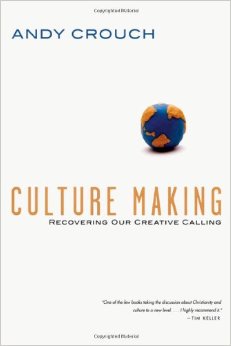
 Andy Crouch’s famous book puts our task in a word: culture-making. It’s how we image God and it is what Al Wolter’s in Creation Regained calls our foundational command.
Andy Crouch’s famous book puts our task in a word: culture-making. It’s how we image God and it is what Al Wolter’s in Creation Regained calls our foundational command.
The Bible warns us not to trust idols, says to not be “of the world” and calls us to be “non-conformed.” We are a “peculiar people” and 1 Peter says “be holy as I am holy.” Scriptures warn us against being “taken captive” by worldly ideologies and we need to hear more in most churches about the call to righteousness in thought, word, and deed.
There is little doubt that Dreher is right that many churches these days don’t really help us live into the sort of holiness to which we are called.
But the same Bible also holds out a vision of the renewal of all things. Everything. The Bible tells us to go into the world; it just does. There is no escaping the missional call to serve our neighbors, the public sphere, working “in but not of” the society around us.
Further, the Bible warns us not to “call impure what God has called clean” (As Peter learned the hard way in Acts 10:15.) I think that any insinuation that this world is too bad to be redeemed or too impure for us to handle — and whether such insinuation hovers around Dreher’s book you can decide for yourself — needs to be confronted with the stark truth of the warnings in Colossians 2:21 or I Timothy 4: 1-3 where the naysayers are reproved. In that anti-gnostic Timothy passage, Paul suggests that the error of disdaining the God-given gifts of the world is either an “old wives tale” or flatly inspired by demons. Either way, good ministers are called to teach the truth of the goodness of things. Look it up and tell me if I’m wrong. And tell me how we can balanced the proper concerns of The Benedict Option and its dire warnings and manifesto-like cry for “strategic withdrawal” with this kind of joy in the goodness of creation and confidence in the restoring redemption of Christ the King.

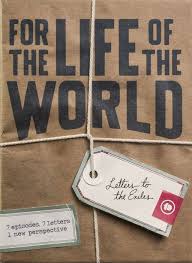 As an Orthodox believer, Dreher wisely cites, at one point, the famed Russian Orthodox theologian Alexander Schmemman. He does not cite his most famous work, though, For the Life of the World, which inspired the Acton Institute’s beloved film series by that same name, offering a combo of Schmemman and Abraham Kuyper, drawing us into bigger visions of the redemption of all of life by bringing poet Gerard Manley Hopkins into conversation with theologian Hans Von Balthshar, for instance. Work, family, politics, art, learning — it’s all gift, it’s all service, even in (as the DVD explores) a state of exile. Our church liturgy anticipates the final restoration of things; the beautiful last lesson on the DVD makes that wonderfully vivid. As such, good liturgy — according to the DVD For the Life of the World, at least — is hopeful. We hear good news each week and practice ways of embodying such hope, even in exile. I think Rod should worry less about Supreme Court rulings and listen better, week after week, to that great liturgical refrain: He Is Risen. He is Risen Indeed.
As an Orthodox believer, Dreher wisely cites, at one point, the famed Russian Orthodox theologian Alexander Schmemman. He does not cite his most famous work, though, For the Life of the World, which inspired the Acton Institute’s beloved film series by that same name, offering a combo of Schmemman and Abraham Kuyper, drawing us into bigger visions of the redemption of all of life by bringing poet Gerard Manley Hopkins into conversation with theologian Hans Von Balthshar, for instance. Work, family, politics, art, learning — it’s all gift, it’s all service, even in (as the DVD explores) a state of exile. Our church liturgy anticipates the final restoration of things; the beautiful last lesson on the DVD makes that wonderfully vivid. As such, good liturgy — according to the DVD For the Life of the World, at least — is hopeful. We hear good news each week and practice ways of embodying such hope, even in exile. I think Rod should worry less about Supreme Court rulings and listen better, week after week, to that great liturgical refrain: He Is Risen. He is Risen Indeed.
Despite all, I truly recommend reading, reflecting on, prayerfully considering, and talking with others about The Benedict Option: A Strategy for Christians in a Post-Christian Nation. One will have to overlook some negativity and theologically dangerous dead ends, but much will be very, very helpful. Most of all, it will cause you to reconsider, re-evaluate a bit. For this reason, I think it is worth reading with discernment, and heeding whatever seems wise and prudent in these complicated days, for the life of the world.

BookNotes
DISCOUNT
ANY ITEM MENTIONED
10% off
order here
takes you to the secure Hearts & Minds order form page
just tell us what you want
inquire here
if you have questions or need more information
just ask us what you want to know
read@heartsandmindsbooks.com
